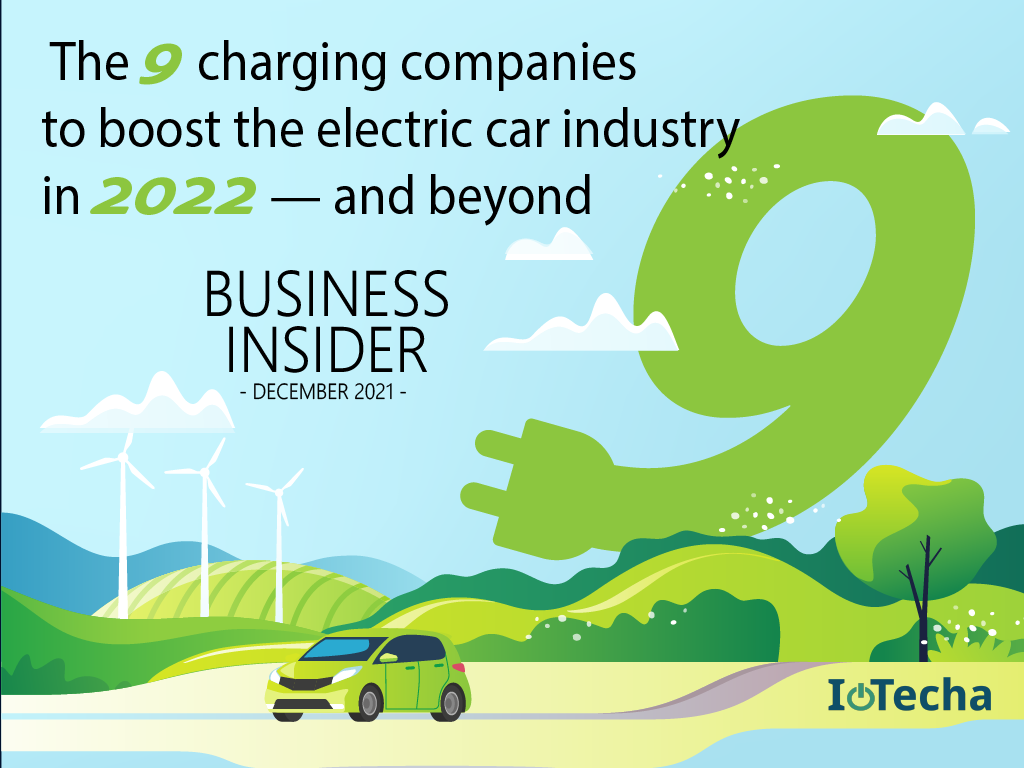Investors are betting on these 9 charging companies to boost the electric car industry in 2022 — and beyond
January 7, 2022

Business Insider
Investors are betting on these 9 charging companies to boost the electric car industry in 2022 — and beyond
Alexa St. John
Dec 23, 2021
Nine EV charging companies attracted the most funding from investors this year. Volta
Electric vehicle charging companies raised a lot of money in 2021.
Experts expect that trend to accelerate next year as EV adoption grows.
Here are the 9 charging companies that drew the most funding in 2021 and what that means for 2022.
Investors made it clear with their pocketbooks this past year: Electric vehicle charging could make or break the world’s shift away from gas-powered cars.
In 2021, investors who in previous years piled money into the likes of Rivian and Lucid turned their gaze to the infrastructure on which those automakers’ vehicles will depend.
From vehicle charging stations, to better ways of delivering power with the electrical grid, to solutions that bring charging to the driver, the industry can expect to see even more movement in the charging space come next year. And if 2021 is any sign, investors will stay eager to foster these opportunities.
McKinsey anticipates the charging industry will be valued at $150 billion to $200 billion across North America, Europe, and China by the end of the decade. And charging needs, coupled with the new business opportunities that come with drivers plugging in instead of fueling up, will continue to spark solutions to one of the biggest questions for consumers considering EVs.
EV sales are steadily climbing, automakers are rolling out more models, and regulators are doubling down on rules demanding zero emission vehicles. But the infrastructure to support these battery-powered cars is still lacking, experts say.
“Charging infrastructure is very much behind the curve of where the actual market’s going,” said Calum MacRae, head of automotive at consultancy GlobalData. “We’re in a position where we’re all rushing to get the charging points we need to sustain a market that’s going to be at 50 to 60 percent in five years’ time.”
Just one of the many problems with the current infrastructure: how drivers living in multifamily dwellings can plug-in. “These are massive opportunities but it’s very fragmented at the moment,” MacRae said.
Here’s a look at the nine EV charging companies that investors poured the most funding into this year. (The data, provided by PitchBook, is as of December 8.)
1. Ample
Headquarters: San Francisco, California
Amount: $275.7 million
CEO: Khaled Hassounah
What it does: The startup’s technology aims to let electric cars pull up to an automated, modular battery-swapping station and leave with a fully charged battery in less than 10 minutes. The seven-year-old company is largely focused on ride-hailing through its partnership with Uber, and hopes to solve Uber’s biggest challenge in going electric. It requires vehicles to be equipped with its architecture, which is currently available in 11 vehicle models across five automakers. Ample is also focused on providing for electric fleets before serving individual EV drivers.
2. Volta
Headquarters: San Francisco, California
Amount: $125 million
CEO: Scott Mercer
What it does: Founded in 2010, Volta pitches itself as a “commerce-centric” EV charging network that targets places where consumers go about their daily routines, like shopping centers. Plugging in is free: Volta’s revenue primarily comes from the advertising it displays on the screens connected to its chargers. Volta went public via merger with special purpose acquisition company Tortoise Acquisition Corp. 11 this year.
3. WiTricity
Headquarters: Watertown, Massachusetts
Amount: $52 million
CEO: Alex Gruzen
What it does: More and more EV industry companies are leaning into the idea of charging that shouldn’t require the hassle of complex electrical hookups, utility work, and massive plugs. After all, consumers have gotten used to the idea of wireless iPhone charging. Spun out of the Massachusetts Institute of Technology in 2007, WiTricity is one of those players. Instead of plugging in, EVs equipped with WiTricity tech can simply pull in to a WiTricity wireless charging hub and juice up. The startup’s charging pads, which use a magnetic resonance technology instead of inductive charging, can be installed in driveways, parking garages, or other places drivers might look to charge. WiTricity has had pilots with major automakers for several years, and announced its vehicle tech debuted on the Hyundai Genesis GV60 in South Korea in October.
4. Span
Headquarters: San Francisco, California
Amount: $30.4 million
CEO: Arch Rao
What it does: Founded in 2018 by the former head of product at Tesla Energy, Span develops energy efficient residential electrical panels and Level 2 EV charging systems. It recently launched Span Drive, an EV charger that allows drivers to manage their charging more efficiently and more optimized using solar power. It capitalizes on the renewable electricity that some drivers already have available at their homes, and can manage a vehicle’s charge source, speed, and schedule. The system can also help EV owners charge their vehicles during off-peak charging times and during power outages using stored backup energy.
5. WeaveGrid
Headquarters: San Francisco, California
Amount: $15 million
CEO: Apoorv Bhargava
What it does: As EV adoption accelerates across the globe, WeaveGrid, founded in 2018, is developing technology to answer questions about what plugging these vehicles in does to the grid. The company’s software helps utilities connect with EVs, uses machine learning to predict factors such as charging demand in a given area, and allows utilities to manage that demand appropriately.
6. IoTecha
bp invested in IoTecha
Gas giant bp invested in IoTecha earlier this year bp
Headquarters: Cranbury, New Jersey
Amount: $13.2 million
CEO: Oleg Logvinov
What it does: IoTecha offers a variety of EV charging products, including Level 2 chargers that can return energy to the grid. The six-year-old startup also incorporates the standardized Plug and Charge service, which automates payment for plugging in. Today, EV drivers need an app compatible with every different charging network. With Plug and Charge, a driver can plug in and juice up without exchanging any payment information, and later receive a bill routed from the station to the customer via the automaker. IoTecha also plays in the EV grid management space and “smart” charging hardware and software.
7. Fermata Energy
Headquarters: Charlottesville, Virginia
Amount: $12.1 million
CEO: David Slutzky
What it does: Fermata is developing technology that can return energy stored in electric car batteries to the grid during peak demand periods or times of emergency. The vehicle-to-grid technology has been attracting more attention as a way to stabilize the power grid. When not on the road, EVs can be leveraged as a source of energy — for example, electric school buses could return energy to a school when parked.
8. SparkCharge
Headquarters: Somerville, Massachusetts
Amount: $8.5 million
CEO: Joshua Aviv
What it does: Founded in 2017, SparkCharge brings charging to an EV driver — and not just as a roadside assistance service. EV owners can hail the startup’s Roadie mobile charging units via its app, much like they would an Uber, for any reason. SparkCharge drivers take the unit to the vehicle’s location (for instance, private residence, office parking lot, business complex, or campus), and juice up the car. The goal of the service, currently available in San Francisco, San Jose, Los Angeles, and Dallas, is to make it possible to charge anywhere.
9. WattEV
Headquarters: El Segundo, California
Amount: $6 million
CEO: Salim Youssefzadeh
What it does: WattEV wants to help electrify the heavy-duty vehicle industry using its standalone charging infrastructure network and “Truck as a Service” business model. Once available, commercial truck drivers using the WattEV software platform would have access to dedicated charging depots and electric truck stops within the network. Their trips and loads are optimized to meet sustainability and efficiency goals. The startup wants to electrify 12,000 heavy-duty trucks on California roads by 2030.
